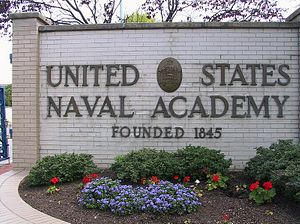Scuttlebutt has it the chief of naval operations, Admiral Jonathan Greenert, may reconsider the ukase that 85 percent or more of Naval Reserve Officer Training Corps midshipmen — budding officers commissioned through reserve units at civilian universities — obtain technical degrees. This news comes from the most reputable of sources, the CNO himself. Earlier this month, Admiral Greenert told a gathering at George Washington University that reevaluating this benchmark periodically is “of great value” to the service.
From this NROTC graduate: huzzah! Three questions to inform this venture in stock-taking. One, what do all midshipmen need to know before joining the fleet? The U.S. Naval Academy at Annapolis, the navy’s undergraduate college, seems to have a handle on this. All Naval Academy students, electrical engineer and English major alike, must undergo an extensive regimen of technical and non-technical coursework.
Seafaring is a technical enterprise. Accordingly, science, technology, engineering, and mathematics — a.k.a. STEM, an acronym grown wearisome of late — courses figure prominently in the core curriculum. Midshipmen toil over such topics as calculus, chemistry, and thermodynamics.
Doing so equips graduates for nuclear-power training, the most technically demanding discipline for U.S. naval officers. Nor does working with numbers hurt for aviators, who have to know their airframes, avionics, and weaponry inside and out. Or for conventional ship drivers, who must acquaint themselves with the diesel, steam, or gas-turbine engineering plants driving their ships in order to qualify as surface warfare officers. Navigation and piloting, weaponeering, communications — numbers and formulas permeate just about everything a junior U.S. Navy line officer does.
So a meaningful review of undergraduate curriculum should start with determining whether the core curriculum at Annapolis equips officers to succeed, no matter what community they end up joining.
Two, why are the educational requirements different for NROTC and Naval Academy midshipmen? If the naval establishment lets NROTC students skip coursework deemed essential at Annapolis, it appears NROTC graduates commence their careers at a disadvantage vis-à-vis their Naval Academy brethren.
Why not synchronize the requirements between the programs if the requirements are what’s needed? Now, admittedly, the navy can’t be too strict about imposing a core curriculum on NROTC programs. Many NROTC students attend college on four-year scholarships. The service can mandate what it likes from them. He who disburses the gold makes the rules. But a variety of circumstances prevail among NROTC students. Some sign onto the program late, receiving two- or three-year scholarships. That compresses the time available for basic coursework. It would be unfair if not impossible to compel, say, a two-year scholarship recipient to complete an exhaustive package of coursework, all in the last half of his or her college education. Or, some midshipmen earn commissions without ever being awarded scholarships. It’s hard to dictate too much unless you’re paying the tuition.
So there are exceptions. As a general rule, though, the requirements should align across accession programs to the maximum extent possible — helping ensigns begin their naval service on an equal footing.
And three, why obsess over the percentage of technical majors? NROTC must comply with that 85 percent threshold, but even Annapolis advertises a 65 percent floor for STEM graduates. Why? If the core curriculum prepares officers for the full range of billets available to them — from nuclear “bubbleheads” cruising the depths to “airedales” flitting across the wild blue — then what difference does it make whether they major in chemical engineering or English literature?
Roughly speaking, most majors consume only about a quarter of a college student’s degree work. Let youngsters’ interests and inclinations take them whither they will for that one year out of four. Classics? Gnarly. Philosophy? Good to go. So let’s dispense with the numerology impelling officer recruitment. Percentages may make good talking points, but they’re largely meaningless in real terms. Or will be so if the core curriculum is sufficiently strong and rich.
Admiral Jim Stavridis, now dean of the dear old Fletcher School (and a man with a truly dour visage), testifies that studying international relations was more helpful than his Naval Academy bachelor’s in engineering: “In all honesty, I found the situations I encountered in the course of my career, I was more benefited by what I had studied about the world” — he’s a Fletcher graduate himself — “than my electrical engineering background.” But why choose? Future Stavridises should be able to major in the social sciences or humanities while still arriving on the waterfront ready to supervise engineering teams, conduct pre-firing checks on the ship’s guns or missiles, or execute whatever duties their skippers entrust to them.
In short, we can have it both ways. So let’s figure out what entry-level officers need to know, and require them to learn it — while also allowing them ample latitude to set their own agenda.

































